Theory of imitation
Download as pptx, pdf33 likes64,523 views
Plato introduces the theory of imitation, which argues that art and literature are imitations of nature rather than reflections of truth or reality. According to Plato's theory, a painter's depiction of a chair is twice removed from the truth since it is an imitation of the carpenter's physical chair, which itself is an imitation of the ideal "chair" form. Plato believed that literature could misguide society and corrupt youth, and thus wanted to ban poets from his republic. However, the conclusion is that while Plato makes a valid point about imitation, poetry is not inherently harmful.
1 of 9
Downloaded 539 times
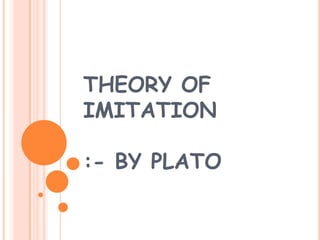
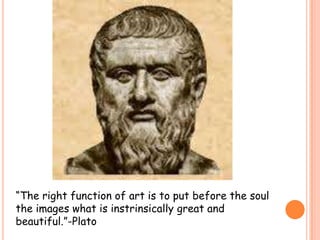
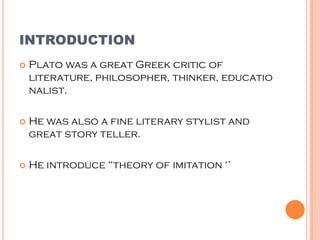
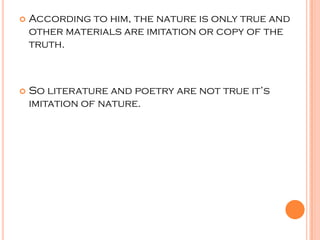
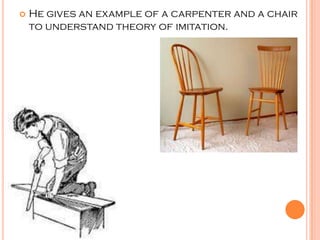
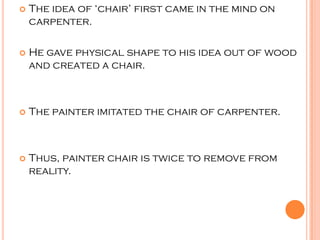
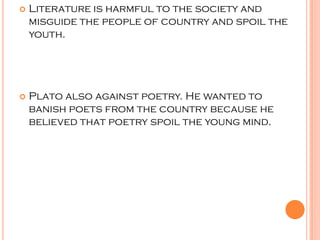
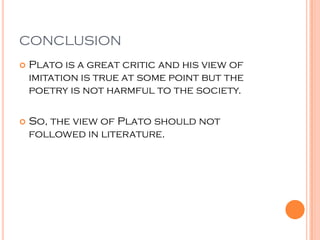

Ad
Recommended
theory of imitation g1.pptx
theory of imitation g1.pptxBismaIshfaq3
╠²
Aristotle's theory of imitation argues that imitation leads to truth and should be learned by all. In contrast to Plato, who viewed imitation as twice removed from reality, Aristotle saw imitation as a creative process that can uplift morality. Aristotle defined three ways of imitation: medium, which is the means of creation; object, such as whether tragedy depicts humans as better than reality; and manner, like whether narration is used.Renaissance
RenaissanceGenesis Ian Fernandez
╠²
This document provides an overview of the Renaissance period in Italy and the role of women. It discusses the rise of the Renaissance due to growing production and populations in Europe. Italian city-states like Florence, Venice and Milan became economic and trade centers. The document then highlights some of the contributions of women like Laura Cereta and Isotta Nogarola to fields like theology, philosophy and education, as well as other female artists and writers who made important contributions to literature, poetry and painting during the Renaissance, despite many universities not accepting women at the time.Functions and Philosophical Perspectives on Art
Functions and Philosophical Perspectives on ArtJanril Dela Cruz
╠²
This lesson discusses the functions of art, distinguishing between functional and non-functional art, and explores philosophical perspectives on art, including viewpoints from Aristotle and Plato. It covers various functions of art including personal, social, physical, and historical, as well as the role of art in communicating emotions and its significance in daily life. The lesson concludes with reflective questions to apply concepts to personal experiences and encourage further understanding of art's purpose.Science 7 - Saturated and Unsaturated Solutions.pdf
Science 7 - Saturated and Unsaturated Solutions.pdfJAENKIETHROCIOS2
╠²
This document provides information about saturated and unsaturated solutions. It defines key terms like solvent, solute, solution, solubility, saturated solution, and unsaturated solution. It explains that a saturated solution contains the maximum amount of solute that can dissolve at a given temperature, while an unsaturated solution contains less. It presents an example using table salt dissolved in water, identifying that 35g of salt dissolved in 100mL of water forms a saturated solution, while less salt produces an unsaturated solution.Intro to-literary-criticism
Intro to-literary-criticismChamiePapersty
╠²
Literary criticism involves analyzing and interpreting works of literature. There are several approaches to literary criticism, including formalist, which focuses on elements like structure and symbolism within the text; biographical, which examines the influence of the author's life; and psychological, which applies theories like Freudian concepts to understand characters. Literary theory provides different lenses through which texts can be interpreted.Introduction to Literature
Introduction to LiteratureMonte Christo
╠²
This document provides an introduction to literature. It defines literature as a body of work containing imaginative language that portrays human experiences, emotions, and thoughts. Literature is considered a product of culture that reflects a society's values. Studying literature allows one to learn about people and cultures across time and space. The document also discusses various literary standards such as universality, artistry, and permanence. It outlines different approaches to analyzing literature, including formalistic, moral, historical, sociological, cultural, and psychological approaches. Finally, it distinguishes between two general types of literature - poetry and prose - and some common genres including short stories, novels, drama, and essays.Language development in early childhood
Language development in early childhoodDmitry Olshansky
╠²
Between ages 2-6, children's vocabulary grows enormously from 200 words to 10,000 words. During this period, children learn new words through fast mapping and contrasting new words with words they already know. They also start making guesses about meanings and developing biases like mutual exclusivity around ages 2-3. Adults play an important role by recasting language, expanding on what children say, listening attentively, and encouraging further discussion. By ages 3-4, children's grammar develops to include simple sentences following subject-verb-object order and mastery of basic rules and structures, though questions and agreement may still vary. Language acquisition is supported through conversations, reading books, and outings that stimulate learning.Statement of Change in Equity
Statement of Change in EquityEdmerConstantino
╠²
The document discusses the Statement of Changes in Equity (SoCE), including its purpose, elements, and how it is presented depending on the form of business organization. It covers sole proprietorships, partnerships, and corporations. For sole proprietorships, the SoCE summarizes the owner's capital account transactions. For partnerships, it shows the capital account of each partner. For corporations, it tracks the balances of capital stock, additional paid-in capital, and retained earnings accounts. The document also provides examples of how to prepare SoCE for different business types.AristotleŌĆÖs theory of imitation
AristotleŌĆÖs theory of imitationHafsahZafar
╠²
The document explores the relationship between art, particularly poetry, and imitation of reality, emphasizing that poetry goes beyond mere representation to capture deeper emotions and ideas. It discusses the creative process in art, noting that poetry is closer to music due to its use of rhythm and harmony while also incorporating language. Additionally, it touches on the significance of tragedy and the necessity of relevance in poetry.IMITATION POWER POINT PRESENTATION
IMITATION POWER POINT PRESENTATIONinetkply
╠²
This document discusses the concept of imitation in literature according to Plato and Aristotle. Plato viewed imitation as being twice removed from reality and saw poetry as a dangerous rival to morality. In contrast, Aristotle gave imitation new significance and saw poetry as one of the fine arts that involves creative vision rather than mere copying. The document also notes that while all art involves imitation, the medium of imitation differs between forms like poetry and painting. It concludes by stating that poetic imitation focuses on portraying people in action that may be better or worse than real life.Longinus The sublime
Longinus The sublime Belachew Weldegebriel
╠²
The document discusses 'On the Sublime,' a classic treatise on aesthetics attributed to Longinus, emphasizing the qualities of good writing that elevate a work to sublimity. Longinus identifies five sources of sublimity: grandeur of thought, strong emotion, figures of speech, noble diction, and dignified composition, arguing that literature's purpose is aesthetic rather than didactic. He bridges classical and romantic influences by valuing emotion and beauty in literary expression while promoting an elevation of style.Arnold and his criticism
Arnold and his criticism Iffat Jahan Suchona
╠²
The Victorian Era (1837-1901), marked by social codes and contrast between progress and poverty, saw Matthew Arnold emerge as a significant literary critic, stressing the importance of objective criticism separate from personal biases. Arnold advocated for poetry as a critical interpretation of life, expressing that it holds essential truths necessary for understanding existence, while arguing that high seriousness and the grand style are crucial for poetic excellence. He introduced the 'touchstone method' for literary evaluation and critiqued historical and personal biases in judgment, positioning himself as a pivotal figure in the evolution of English literary criticism.A Study of Poetry | Critical Essay by Matthew Arnold
A Study of Poetry | Critical Essay by Matthew ArnoldMansur Saleem
╠²
Matthew Arnold's essay criticizes poetry and criticism. He argues that poetry will provide enduring comfort through its ideas. Arnold proposes evaluating poetry through "real," "historic," and "personal" estimates. The "real estimate" judges poetry objectively based on creative merit, while the "historic estimate" prioritizes historical context over artistic value. The "personal estimate" relies on subjective tastes. Arnold advocates the "touchstone method" of comparing works to classics like Homer, Dante and Shakespeare to assess poetic quality. He analyses various poets like Chaucer, Dryden and Pope through this framework.On the sublime
On the sublime St:Mary's College
╠²
This document summarizes Longinus's treatise "On the Sublime", which analyzes the concept of sublimity in language and its ability to elevate discourse. It defines sublimity as consisting of lofty language that sways readers through grandeur of thought, treatment of passions, figures of speech and thought, dignified expression through word choice and metaphor, and majestic structure. While sublimity cannot be innate, it can be developed through instruction and reason. The document outlines Longinus's influential views on sublimity that shaped Romantic literature and criticism.Tradition and individual talent
Tradition and individual talentMustheena k
╠²
1) T.S. Eliot's 1919 essay "Tradition and the Individual Talent" discusses his view of the relationship between poets and the literary tradition that preceded them.
2) Eliot argues that a poet's mind acts as a catalyst that synthesizes feelings and emotions into an artistic creation, emerging from the process unaffected. For Eliot, successful poetry achieves an impersonal form of expression that exists independently of its poet.
3) According to Eliot, a poet must be conscious of both the present and past literary traditions in order to create new works that alter how the past is understood, representing a fusion of different time periods. The progress of the artist involves a continual self-sacrifDhvani Theory
Dhvani TheorySneha Agravat
╠²
This document discusses the Dhvani theory of Indian poetics. It explains that Dhvani theory focuses on suggestion and symbolism in poetry rather than direct meanings. The Dhvani school was formulated by Anandavardhana in the 9th century, who argued that aesthetic pleasure or rasa in a poem is experienced through suggestion rather than the literal meaning of words. There are three types of implicit meanings - vastu dhvani implies rare ideas, alankara dhvani suggests figures of speech, and rasa dhvani evokes aesthetic emotions. Words have three powers - abhidha is the basic meaning, lakshana indicates deeper meanings, and vyanjana is what is suggestedArnold and his criticism [The Study of Poetry]
Arnold and his criticism [The Study of Poetry]Iffat Jahan Suchona
╠²
The Victorian era (1837-1901) was marked by social contrasts, technological advances, and the rise of literary criticism, most notably through Matthew Arnold, who stressed the importance of poetry as a 'criticism of life.' Arnold's critical approach emphasized objective standards in literature, distinguishing between personal and historical judgments to reveal 'real estimates' of poetic worth while imploring readers to focus on the moral and emotional depth of poetry. Despite being overshadowed by contemporaries like Tennyson and Browning, Arnold's intellectual contribution to poetry and criticism remains significant for understanding Victorian literature's transition to modernism.Sir Philip Sidney's Defence of Poesie
Sir Philip Sidney's Defence of PoesieDilip Barad
╠²
In 'Defence of Poesie,' Sir Philip Sidney articulates a defense of poetry against critics like Stephen Gosson, asserting that poets are essential philosophers who create ideal worlds and inspire virtuous action. He argues that poetry, defined as an art of imitation that teaches and delights, holds a nobility that surpasses the mere representation of historical truths. Sidney's work is a crucial early contribution to literary criticism, emphasizing poetry's role in shaping literary and national identity.Litrary critesim - on the sublime by longinus
Litrary critesim - on the sublime by longinusYounis A. Duhoky
╠²
In 'On the Sublime,' traditionally attributed to Longinus, the author explores what constitutes good writing, emphasizing the concept of the sublimeŌĆöa profound emotional state often evoked by nature's power. Longinus identifies five sources of sublimity: strength of thought, inspired emotion, effective use of figures of speech, notable language, and a dignified overall effect, while distinguishing true sublime writing from false sublimity created by lack of genuine passion and poor technique. This treatise critiques both literary excellence and the pitfalls that can detract from authentic expression.4. touchstone method
4. touchstone methodhafsa abbas
╠²
1. Matthew Arnold introduced the touchstone method of literary criticism to evaluate poetry. He proposed using passages from known classics as "touchstones" to test the quality of contemporary works.
2. According to Arnold's method, a work is considered a true classic if it moves the reader in the same way as passages from great masters like Homer, Dante, Shakespeare, and Milton.
3. The touchstone method provides an objective standard for evaluation that avoids the subjectivity of personal taste or overemphasis on a work's historical importance rather than poetic merit.The Caretaker by Harold Pinter
The Caretaker by Harold PinterNachole Govt College, Chapainawabganj, Bangladesh
╠²
The document provides an overview of Harold Pinter's life, his significant plays, and his contributions to literature, particularly focusing on his celebrated work 'The Caretaker.' The play explores themes of isolation, communication, absurdity, and the nuances of family relationships through the interactions of its three characters: Aston, Mick, and Davies, set against the backdrop of 1950s London. In addition, it discusses Pinter's style, characterized by the use of silence and understated dialogue, and situates his work within the context of the Theatre of the Absurd.Intentional fallacy
Intentional fallacyhitesh joshi
╠²
1. The intentional fallacy refers to judging a literary work based on the author's intended meaning rather than analyzing what is presented in the text itself.
2. W.K. Wimsatt Jr. and Monroe Beardsley introduced the concept of the intentional fallacy in their 1954 essay to argue that an author's intentions are neither known nor important for literary analysis or criticism.
3. The intentional fallacy was an important concept in New Criticism, which emphasized close analysis of literary texts without consideration of authorial intent, biography, or historical context.Plato's Objection to Poetry and Aristotle's Defence
Plato's Objection to Poetry and Aristotle's DefenceDilip Barad
╠²
The document discusses Plato's objections to poetry, arguing that it is unethical, uneducational, and inferior to philosophy due to its reliance on illusion and emotional appeal. In contrast, Aristotle defends poetry as a valuable form of imitation that can express universal truths and provide moral lessons through catharsis. The text concludes that each art form, including poetry, should be assessed based on its unique aims rather than judged by the standards of philosophy or ethics.Catharsis by Aristotle
Catharsis by Aristotle VaibhavCollege
╠²
The document discusses Aristotle's concept of catharsis from his work Poetics. Catharsis refers to the purging of emotions, especially fear and pity, that occurs when watching a tragedy. While Aristotle did not provide a specific definition, catharsis is generally thought to be the healthy and humanizing effect experienced by spectators through feeling fear vicariously in a controlled setting of a tragic story. The document provides examples of catharsis in Shakespeare's plays Macbeth and Romeo and Juliet.Aristotle's poetics
Aristotle's poetics St:Mary's College
╠²
Aristotle's 'Poetics' is a foundational text in literary criticism that responds to Plato's views on poetry, focusing on the nature and purpose of tragedy. The work outlines key concepts such as plot, character, thought, diction, and spectacle, defining tragedy as an imitation of serious action that arouses fear and pity. Aristotle argues for the importance of unity of action in tragedy, contrasts it with epic poetry, and establishes the characteristics of the ideal tragic hero.Preface wordsworth
Preface wordsworthDr. Kaushal Desai
╠²
This document summarizes William Wordsworth's preface to Lyrical Ballads published in 1800. It provides background on Wordsworth and his collaboration with Samuel Taylor Coleridge on Lyrical Ballads in 1798. The preface laid out Wordsworth's theory that poetry should be written using ordinary language to describe common sights and sounds and everyday experiences to arouse feelings of tranquility and pleasure in the reader. Wordsworth believed poetry originated from emotions recollected later and the poet acts as an interpreter of those feelings and nature for readers. The document outlines some of Wordsworth's most famous poems and ideas around the role of imagination and poetry's relationship to nature from the preface.T.s eliot theory of objective correlative
T.s eliot theory of objective correlativeneelab1234
╠²
The document discusses T.S. Eliot's theory of the objective correlative. The theory holds that writers can evoke emotions in readers through a combination of objects, events, and details rather than directly stating the emotion. Eliot believed poets must find an objective correlative formula to represent emotions for readers. The document also examines Eliot's views on poetic process, tradition and criticism, and provides an example of an effective objective correlative in Macbeth.Aristotle's Poetics - Epic And Tragedy
Aristotle's Poetics - Epic And TragedyWater Birds (Ali)
╠²
The document explores the concepts of epic and tragedy in literature, defining each along with their origins, characteristics, and examples. It highlights Aristotle's contributions to the understanding of these forms, detailing similarities and differences between them, as well as how they should be presented. Notable works and playwrights in both genres, such as Homer's epics and Greek tragedians like Sophocles and Euripides, are also mentioned.Language acquisition
Language acquisitionAsty Kim
╠²
This document discusses language acquisition, including definitions, key concepts, and stages of acquisition for first and second languages. It defines language acquisition as the process of developing the ability to use and comprehend language. For first languages, it describes stages from birth to age 4 including babbling, single words, and two-word combinations leading to basic sentence structure. Second language acquisition occurs after mastering a first language, such as when moving to a new country or learning a language in school.The acquisition process
The acquisition processElif G├╝ll├╝budak
╠²
1. The document discusses how children acquire their first language without direct instruction, instead constructing language through interactions.
2. Children do not simply imitate adult speech but actively test out their own constructions. Adults also do not produce all the expressions children use.
3. As children's language develops, they begin incorporating morphological and syntactic structures like plurals, past tense, questions and negatives in their own way before fully mastering conventions. Their meanings for words may also be broader than adults'.More Related Content
What's hot (20)
AristotleŌĆÖs theory of imitation
AristotleŌĆÖs theory of imitationHafsahZafar
╠²
The document explores the relationship between art, particularly poetry, and imitation of reality, emphasizing that poetry goes beyond mere representation to capture deeper emotions and ideas. It discusses the creative process in art, noting that poetry is closer to music due to its use of rhythm and harmony while also incorporating language. Additionally, it touches on the significance of tragedy and the necessity of relevance in poetry.IMITATION POWER POINT PRESENTATION
IMITATION POWER POINT PRESENTATIONinetkply
╠²
This document discusses the concept of imitation in literature according to Plato and Aristotle. Plato viewed imitation as being twice removed from reality and saw poetry as a dangerous rival to morality. In contrast, Aristotle gave imitation new significance and saw poetry as one of the fine arts that involves creative vision rather than mere copying. The document also notes that while all art involves imitation, the medium of imitation differs between forms like poetry and painting. It concludes by stating that poetic imitation focuses on portraying people in action that may be better or worse than real life.Longinus The sublime
Longinus The sublime Belachew Weldegebriel
╠²
The document discusses 'On the Sublime,' a classic treatise on aesthetics attributed to Longinus, emphasizing the qualities of good writing that elevate a work to sublimity. Longinus identifies five sources of sublimity: grandeur of thought, strong emotion, figures of speech, noble diction, and dignified composition, arguing that literature's purpose is aesthetic rather than didactic. He bridges classical and romantic influences by valuing emotion and beauty in literary expression while promoting an elevation of style.Arnold and his criticism
Arnold and his criticism Iffat Jahan Suchona
╠²
The Victorian Era (1837-1901), marked by social codes and contrast between progress and poverty, saw Matthew Arnold emerge as a significant literary critic, stressing the importance of objective criticism separate from personal biases. Arnold advocated for poetry as a critical interpretation of life, expressing that it holds essential truths necessary for understanding existence, while arguing that high seriousness and the grand style are crucial for poetic excellence. He introduced the 'touchstone method' for literary evaluation and critiqued historical and personal biases in judgment, positioning himself as a pivotal figure in the evolution of English literary criticism.A Study of Poetry | Critical Essay by Matthew Arnold
A Study of Poetry | Critical Essay by Matthew ArnoldMansur Saleem
╠²
Matthew Arnold's essay criticizes poetry and criticism. He argues that poetry will provide enduring comfort through its ideas. Arnold proposes evaluating poetry through "real," "historic," and "personal" estimates. The "real estimate" judges poetry objectively based on creative merit, while the "historic estimate" prioritizes historical context over artistic value. The "personal estimate" relies on subjective tastes. Arnold advocates the "touchstone method" of comparing works to classics like Homer, Dante and Shakespeare to assess poetic quality. He analyses various poets like Chaucer, Dryden and Pope through this framework.On the sublime
On the sublime St:Mary's College
╠²
This document summarizes Longinus's treatise "On the Sublime", which analyzes the concept of sublimity in language and its ability to elevate discourse. It defines sublimity as consisting of lofty language that sways readers through grandeur of thought, treatment of passions, figures of speech and thought, dignified expression through word choice and metaphor, and majestic structure. While sublimity cannot be innate, it can be developed through instruction and reason. The document outlines Longinus's influential views on sublimity that shaped Romantic literature and criticism.Tradition and individual talent
Tradition and individual talentMustheena k
╠²
1) T.S. Eliot's 1919 essay "Tradition and the Individual Talent" discusses his view of the relationship between poets and the literary tradition that preceded them.
2) Eliot argues that a poet's mind acts as a catalyst that synthesizes feelings and emotions into an artistic creation, emerging from the process unaffected. For Eliot, successful poetry achieves an impersonal form of expression that exists independently of its poet.
3) According to Eliot, a poet must be conscious of both the present and past literary traditions in order to create new works that alter how the past is understood, representing a fusion of different time periods. The progress of the artist involves a continual self-sacrifDhvani Theory
Dhvani TheorySneha Agravat
╠²
This document discusses the Dhvani theory of Indian poetics. It explains that Dhvani theory focuses on suggestion and symbolism in poetry rather than direct meanings. The Dhvani school was formulated by Anandavardhana in the 9th century, who argued that aesthetic pleasure or rasa in a poem is experienced through suggestion rather than the literal meaning of words. There are three types of implicit meanings - vastu dhvani implies rare ideas, alankara dhvani suggests figures of speech, and rasa dhvani evokes aesthetic emotions. Words have three powers - abhidha is the basic meaning, lakshana indicates deeper meanings, and vyanjana is what is suggestedArnold and his criticism [The Study of Poetry]
Arnold and his criticism [The Study of Poetry]Iffat Jahan Suchona
╠²
The Victorian era (1837-1901) was marked by social contrasts, technological advances, and the rise of literary criticism, most notably through Matthew Arnold, who stressed the importance of poetry as a 'criticism of life.' Arnold's critical approach emphasized objective standards in literature, distinguishing between personal and historical judgments to reveal 'real estimates' of poetic worth while imploring readers to focus on the moral and emotional depth of poetry. Despite being overshadowed by contemporaries like Tennyson and Browning, Arnold's intellectual contribution to poetry and criticism remains significant for understanding Victorian literature's transition to modernism.Sir Philip Sidney's Defence of Poesie
Sir Philip Sidney's Defence of PoesieDilip Barad
╠²
In 'Defence of Poesie,' Sir Philip Sidney articulates a defense of poetry against critics like Stephen Gosson, asserting that poets are essential philosophers who create ideal worlds and inspire virtuous action. He argues that poetry, defined as an art of imitation that teaches and delights, holds a nobility that surpasses the mere representation of historical truths. Sidney's work is a crucial early contribution to literary criticism, emphasizing poetry's role in shaping literary and national identity.Litrary critesim - on the sublime by longinus
Litrary critesim - on the sublime by longinusYounis A. Duhoky
╠²
In 'On the Sublime,' traditionally attributed to Longinus, the author explores what constitutes good writing, emphasizing the concept of the sublimeŌĆöa profound emotional state often evoked by nature's power. Longinus identifies five sources of sublimity: strength of thought, inspired emotion, effective use of figures of speech, notable language, and a dignified overall effect, while distinguishing true sublime writing from false sublimity created by lack of genuine passion and poor technique. This treatise critiques both literary excellence and the pitfalls that can detract from authentic expression.4. touchstone method
4. touchstone methodhafsa abbas
╠²
1. Matthew Arnold introduced the touchstone method of literary criticism to evaluate poetry. He proposed using passages from known classics as "touchstones" to test the quality of contemporary works.
2. According to Arnold's method, a work is considered a true classic if it moves the reader in the same way as passages from great masters like Homer, Dante, Shakespeare, and Milton.
3. The touchstone method provides an objective standard for evaluation that avoids the subjectivity of personal taste or overemphasis on a work's historical importance rather than poetic merit.The Caretaker by Harold Pinter
The Caretaker by Harold PinterNachole Govt College, Chapainawabganj, Bangladesh
╠²
The document provides an overview of Harold Pinter's life, his significant plays, and his contributions to literature, particularly focusing on his celebrated work 'The Caretaker.' The play explores themes of isolation, communication, absurdity, and the nuances of family relationships through the interactions of its three characters: Aston, Mick, and Davies, set against the backdrop of 1950s London. In addition, it discusses Pinter's style, characterized by the use of silence and understated dialogue, and situates his work within the context of the Theatre of the Absurd.Intentional fallacy
Intentional fallacyhitesh joshi
╠²
1. The intentional fallacy refers to judging a literary work based on the author's intended meaning rather than analyzing what is presented in the text itself.
2. W.K. Wimsatt Jr. and Monroe Beardsley introduced the concept of the intentional fallacy in their 1954 essay to argue that an author's intentions are neither known nor important for literary analysis or criticism.
3. The intentional fallacy was an important concept in New Criticism, which emphasized close analysis of literary texts without consideration of authorial intent, biography, or historical context.Plato's Objection to Poetry and Aristotle's Defence
Plato's Objection to Poetry and Aristotle's DefenceDilip Barad
╠²
The document discusses Plato's objections to poetry, arguing that it is unethical, uneducational, and inferior to philosophy due to its reliance on illusion and emotional appeal. In contrast, Aristotle defends poetry as a valuable form of imitation that can express universal truths and provide moral lessons through catharsis. The text concludes that each art form, including poetry, should be assessed based on its unique aims rather than judged by the standards of philosophy or ethics.Catharsis by Aristotle
Catharsis by Aristotle VaibhavCollege
╠²
The document discusses Aristotle's concept of catharsis from his work Poetics. Catharsis refers to the purging of emotions, especially fear and pity, that occurs when watching a tragedy. While Aristotle did not provide a specific definition, catharsis is generally thought to be the healthy and humanizing effect experienced by spectators through feeling fear vicariously in a controlled setting of a tragic story. The document provides examples of catharsis in Shakespeare's plays Macbeth and Romeo and Juliet.Aristotle's poetics
Aristotle's poetics St:Mary's College
╠²
Aristotle's 'Poetics' is a foundational text in literary criticism that responds to Plato's views on poetry, focusing on the nature and purpose of tragedy. The work outlines key concepts such as plot, character, thought, diction, and spectacle, defining tragedy as an imitation of serious action that arouses fear and pity. Aristotle argues for the importance of unity of action in tragedy, contrasts it with epic poetry, and establishes the characteristics of the ideal tragic hero.Preface wordsworth
Preface wordsworthDr. Kaushal Desai
╠²
This document summarizes William Wordsworth's preface to Lyrical Ballads published in 1800. It provides background on Wordsworth and his collaboration with Samuel Taylor Coleridge on Lyrical Ballads in 1798. The preface laid out Wordsworth's theory that poetry should be written using ordinary language to describe common sights and sounds and everyday experiences to arouse feelings of tranquility and pleasure in the reader. Wordsworth believed poetry originated from emotions recollected later and the poet acts as an interpreter of those feelings and nature for readers. The document outlines some of Wordsworth's most famous poems and ideas around the role of imagination and poetry's relationship to nature from the preface.T.s eliot theory of objective correlative
T.s eliot theory of objective correlativeneelab1234
╠²
The document discusses T.S. Eliot's theory of the objective correlative. The theory holds that writers can evoke emotions in readers through a combination of objects, events, and details rather than directly stating the emotion. Eliot believed poets must find an objective correlative formula to represent emotions for readers. The document also examines Eliot's views on poetic process, tradition and criticism, and provides an example of an effective objective correlative in Macbeth.Aristotle's Poetics - Epic And Tragedy
Aristotle's Poetics - Epic And TragedyWater Birds (Ali)
╠²
The document explores the concepts of epic and tragedy in literature, defining each along with their origins, characteristics, and examples. It highlights Aristotle's contributions to the understanding of these forms, detailing similarities and differences between them, as well as how they should be presented. Notable works and playwrights in both genres, such as Homer's epics and Greek tragedians like Sophocles and Euripides, are also mentioned.Viewers also liked (12)
Language acquisition
Language acquisitionAsty Kim
╠²
This document discusses language acquisition, including definitions, key concepts, and stages of acquisition for first and second languages. It defines language acquisition as the process of developing the ability to use and comprehend language. For first languages, it describes stages from birth to age 4 including babbling, single words, and two-word combinations leading to basic sentence structure. Second language acquisition occurs after mastering a first language, such as when moving to a new country or learning a language in school.The acquisition process
The acquisition processElif G├╝ll├╝budak
╠²
1. The document discusses how children acquire their first language without direct instruction, instead constructing language through interactions.
2. Children do not simply imitate adult speech but actively test out their own constructions. Adults also do not produce all the expressions children use.
3. As children's language develops, they begin incorporating morphological and syntactic structures like plurals, past tense, questions and negatives in their own way before fully mastering conventions. Their meanings for words may also be broader than adults'.Language And Brain Development
Language And Brain DevelopmentMarilyn Amoro
╠²
The document explores the relationship between language and brain function, covering neurolinguistics and various language disorders such as aphasia. It discusses stages of first language acquisition in children, including the roles of caregiver speech and the development of morphology and syntax. Additionally, it contrasts first and second language acquisition, highlighting key approaches like the grammar-translation method and communicative approaches to language learning.Language and the brain
Language and the brainPhun Bandith
╠²
This document discusses research on the organization of language in the multilingual brain. It describes how Broca's area and Wernicke's area were identified as critical for language processing and are typically located in the left hemisphere. While language abilities are predominantly left-lateralized, additional brain areas are involved. The organization of first (L1) and second (L2) languages can differ depending on the age of L2 acquisition, level of L2 proficiency, and how the L2 was learned. Younger acquisition and higher proficiency are linked to more similar organization of L1 and L2, while older acquisition involves relatively more right hemisphere involvement for L2. Brain damage generally affects all languages known but the mostNeurolinguistics: Brain and Language
Neurolinguistics: Brain and Language Mohammed Mallah
╠²
The document discusses the relationship between brain function and language, explaining the roles of different brain regions and hemispheres in language processing. It outlines various types of aphasia, their characteristics, and how they affect language comprehension and production. The distinctions between non-fluent and fluent aphasias, including specific examples like Broca's and Wernicke's aphasia, are also highlighted.Language and the brain
Language and the brainNovii CcissNuupypnggaahddhiititanium
╠²
This document discusses neurolinguistics and the relationship between language and the brain. It describes several key language areas in the brain, including Broca's area, Wernicke's area, the motor cortex, and the arcuate fasciculus. It also discusses the localization view that specific language abilities can be linked to specific brain locations. The document then examines phenomena like slips of the tongue and slips of the ear. It provides definitions and examples of different types of aphasia that can result from brain damage, including Broca's aphasia and Wernicke's aphasia. The dichotic listening technique for studying brain asymmetry in auditory processing is also mentioned. Finally, the concept ofThe Language Acquisition Process
The Language Acquisition ProcessM├”├żSii M├Č├Č├¼
╠²
The document discusses different theories of first language acquisition:
[1] The behaviorist theory views language learning as imitation and habit formation through reinforcement of responses to stimuli.
[2] The nativist theory posits that humans are born with an innate language acquisition device that enables the learning of universal linguistic rules.
[3] The functional approach sees language development as dependent on cognitive development and social interaction, with children learning underlying structures and meanings through discourse.Stages of Acquisition of first Language
Stages of Acquisition of first LanguageJoel Acosta
╠²
The document discusses language acquisition in children from birth through age 10. It describes the prelinguistic, one-word, two-word, telegraphic, and later language development stages. Key points covered include the difference between learning and acquisition, the roles of nature and nurture, and how children gradually develop more advanced grammar and vocabulary over time through social interaction.Explaining first language acquisition
Explaining first language acquisitionUTPL UTPL
╠²
The document summarizes theories of first language acquisition. It discusses the imitation/behaviorist theory proposed by Skinner, which views language learning as habit formation through reinforcement. It also discusses the innateness/nativist theory of Chomsky, which posits that humans are born with an innate language acquisition device. The document further examines cognitive, input, and connectionist theories and their varying perspectives on how the environment and mental faculties influence language learning.Language and brain
Language and brainUmm-e-Rooman Yaqoob
╠²
Neurolinguistics and psycholinguistics study the neurological and psychological bases of language. Localization attempts to locate language in the brain and suggests it is an independent faculty rather than part of general thought. Lateralization shows language functions become specialized in each hemisphere, with split-brain patients demonstrating this. The left hemisphere controls language and is dominant for most individuals. Key brain areas involved in language processing include Broca's and Wernicke's areas in the frontal and temporal lobes of the left hemisphere respectively.Language and the brain
Language and the brainClive McGoun
╠²
The human brain is about 1.4 kg and contains over 100 billion neurons. It has four main lobes - frontal, parietal, temporal, and occipital - which control functions like problem-solving, touch, hearing, and vision respectively. The two hemispheres of the brain, left and right, work together but have some specialized functions - the left hemisphere is more logical and analytical while the right is more intuitive and creative. Damage to language areas of the brain can cause aphasia, characterized by difficulties with language production and comprehension. The main types are fluent aphasias like Wernicke's and non-fluent like Broca's, each affecting speech differently based on the location of brain damageAristotle's poetics
Aristotle's poeticsashtri
╠²
This document summarizes Aristotle's work "The Poetics" and its key ideas. It begins by providing background on the author and work. The main points then compare Aristotle and Plato's differing views on poetry and imitation. Key definitions from Aristotle are outlined, such as his definition of tragedy. Other major concepts from "The Poetics" are briefly explained, like catharsis, types of plots, characteristics, and the dramatic unities of time and place. The document concludes by acknowledging room for improvement in the summary but hopes it provided a high-level overview of Aristotle's influential work.Ad
Similar to Theory of imitation (20)
Lc theoritical-3
Lc theoritical-3Abdel-Fattah Adel
╠²
This document discusses ancient literary critics Plato and Aristotle. It summarizes Plato's view that literature is merely an imitation of reality and lacks truth, leading him to banish poets from his Republic. It then discusses Aristotle's Poetics, noting he emphasized literary form over subject matter. Aristotle defined tragedy as imitating noble actions, featuring a tragic hero with a flaw. He saw tragedy and comedy as different types of imitation that provide catharsis. Both critics had significant influence on the development of literary theory.Introduction to Literary Criticism 10 (1).pptx
Introduction to Literary Criticism 10 (1).pptxjessintv
╠²
The document discusses the contributions of Greek philosophers, particularly Plato and Aristotle, to literary criticism, emphasizing their differing perspectives on art and literature. Plato views poetry as a mere imitation of reality that should be censored for moral education, while Aristotle defends poetry and believes it serves a purpose in promoting emotional and ethical understanding. Both philosophers agree on the impact of poetry on human thoughts and behavior but differ in their foundational beliefs about the nature of art.Plato and Aristotle's Views on Poetry by V.Jesinthal Mary
Plato and Aristotle's Views on Poetry by V.Jesinthal Maryjessintv
╠²
The document discusses the philosophical contributions of Plato and Aristotle, highlighting their roles as the 'fathers of western philosophy.' While both philosophers analyzed literature and art, they held contrasting views; Plato criticized art as an immoral imitation of reality, whereas Aristotle viewed it as a recreation of inner human action that has moral significance. Their differing perspectives on idealism versus realism continue to influence modern thoughts on literature and ethics.Plato as a literary critic
Plato as a literary critic AthulyaThankachy1
╠²
Plato was an influential ancient Greek philosopher who criticized poetry and the arts. He believed that poetry was just an imitation of reality, not reality itself, since poets were inspired by gods rather than rational thought. Plato attacked poetry on moral, intellectual, emotional and utilitarian grounds. He argued that poetry did not promote social morality or truth, lacked restraint, and served no useful purpose. Overall, Plato introduced the concept of mimesis, or imitation, as key to understanding art, and stated classical ideals of beauty, though he was highly critical of poetry's rationality and moral influence.Aristotle
AristotleRamyaBharathi25
╠²
Aristotle was a Greek philosopher and critic who lived from 384-322 BC. He studied under Plato at Plato's Academy in Athens and later founded his own school called the Lyceum. Aristotle made many contributions to literary criticism, including his theories of syllogism, causality, and the mean. He disagreed with Plato's view of art as mere imitation, instead arguing that art could teach morality and universal truths through imaginative creation. Aristotle believed poetry was superior to history as it explored what may happen rather than just factual accounts.Plato.ppt
Plato.pptGaurav4788
╠²
Plato was one of the first critics in history and analyzed poetry and literature through his theories of forms and imitation. He believed that the highest level is the world of ideas, and that the physical world is merely an imitation of that ideal form. Literature is twice removed from truth, as it imitates life which imitates ideas. For this reason and others, Plato objected to poetry and expelled poets from his ideal republic, seeing them as unreliable sources of truth that appeal to emotions over reason.criticisms by gharam fawaz al harthiiiii
criticisms by gharam fawaz al harthiiiiiCaty58
╠²
The document discusses key concepts in literary criticism, particularly focusing on Aristotle's theories of mimesis, tragedy, and the elements of drama. It addresses critiques from figures such as Plato and Longinus, highlighting different perspectives on art and its emotional effects. Additionally, it touches on the dynamics between critics in Dryden's 'An Essay of Dramatic Poesy' and the value of poetry as articulated by Sir Philip Sidney.Aristotle's observation on Poetry.pptx
Aristotle's observation on Poetry.pptxNirmala Padmavat
╠²
Aristotle was a Greek philosopher who studied under Plato for 20 years and taught Alexander the Great. He wrote about many subjects including physics, politics, and aesthetics, and was one of the first writers of literary criticism. In his work Poetics, he analyzed tragedy, comedy, and epic poetry. Aristotle believed poetry tries to express universal truths about human nature, and that it originated from human instincts like imitation and finding pleasure in rhythm and harmony. He argued the function of poetry is to provide pleasure, and that the emotional appeal of poetry through catharsis is not harmful but rather health-giving and artistically satisfying, contradicting Plato's view that poetry stirs dangerous emotions.Aesthetic imitation and imitators in aristotle, by katherine e. gilbert
Aesthetic imitation and imitators in aristotle, by katherine e. gilbertMariane Farias
╠²
This article discusses Aristotle's view of aesthetic imitation and imitators. It argues that for Aristotle, imitative art ranks highly and imitators share qualities with philosophers, musicians, and lovers. The article examines Aristotle's concept of art as productive force and his view that imitation in art involves the interaction of contrary principles rather than mere repetition. It concludes that Aristotle saw imitation in art as equivalent to creative production according to a true idea.Plato's charges against poetryas a foundational principle, has deep .pdf
Plato's charges against poetryas a foundational principle, has deep .pdfvardhan2944
╠²
Plato had a profound impact on Western philosophy and was concerned with poetry's ability to imitate reality and distort the truth. He believed poetry could mislead people and corrupt their understanding by stimulating irrational emotions. Plato's solution was to censor poetry in his ideal Republic and only allow works that promoted virtue and upheld state values. While his critique faced counterarguments, it influenced later philosophers and the ongoing discussion around art's role in society and its impact on truth and emotions.Literary theory
Literary theorykarimsebihi1
╠²
This document provides an overview of literary theory and criticism from classical times to modern eras. It begins with definitions of literary theory and criticism, noting that theory provides conceptual frameworks for studying literature while criticism is the practical application and evaluation of works. Major figures from classical antiquity discussed include Plato, Aristotle, Longinus, and Horace, along with their contributions to early understandings of genres, imitation, and literature's functions. The document then outlines developments from the Renaissance through the Victorian era, highlighting influential critics such as Sidney, Jonson, and Dryden. It concludes by listing various modern critical theories and theorists that reflect the expansion of literary study in the 20th century.Literary theory and criticism
Literary theory and criticismNidhi Kunvrani
╠²
Aristotle's theory of mimesis holds that poetry imitates life. It can depict things as they were, as they are said to be, or as they ought to be. Unlike history, which provides only one account, poetry has more freedom and does not claim to present absolute truth. Aristotle disagreed with Plato's view that poetry was merely an imitation and therefore inferior to philosophy. Instead, he argued that poetry could teach truths and provide pleasure, making it more philosophical than history which only presents facts. For Aristotle, mimesis or imitation in poetry was a form of creative representation of human life and the world, not merely duplication.Mdst3703 2013-09-03-plato2
Mdst3703 2013-09-03-plato2Rafael Alvarado
╠²
Plato's cave allegory depicts people chained in an underground cave, watching shadows on the cave wall from puppets manipulated by people behind them. For Plato, this represents ignorance and the limits of human perception without education. Aristotle later argued that all knowledge is based on imitation, defending poetry against Plato's view. Aristotle analyzed tragedy as the highest form of art, defining its key elements as plot, character, thought, diction, song, and spectacle. The plot must be complex, involve recognition and reversal, and arouse pity and fear to achieve catharsis. For both philosophers, education is about emerging from darkness into light by modeling the world through various media like poetry, art, and code.Running Head IMITATIVE ART1IMITATIVE ART3Imit.docx
Running Head IMITATIVE ART1IMITATIVE ART3Imit.docxcowinhelen
╠²
The document explores the concept of imitation in art as discussed by philosophers Plato and Danto, examining how both view art's relationship to reality. Plato condemns poetry as deceptive imitation, while Danto argues for the importance of originality in art, emphasizing that art should not merely replicate reality. The author reflects on the implications of imitation in contemporary art, asserting that artists aim to communicate messages rather than deceive.Presentation 3
Presentation 3Ravjibhai1994
╠²
1. Plato objected to poetry on educational, philosophical, and moral grounds.
2. Educationally, Plato believed that poetry could mislead children and promote immoral behaviors rather than cultivating morality. Philosophically, he saw poetry as an imitation removed from truth and thus not conducive to social progress.
3. Morally, Plato felt that poetry often depicted injustice and wrongdoing as profitable while honest dealings as damaging, which went against his view of promoting high moral values and rationality in society.Plato objection to Aristotle replies
Plato objection to Aristotle replies davemayuri18
╠²
Plato objected to Aristotle's defense of poetry. While Aristotle argued that poetry shapes individuals' characters and presents a more pleasant version of reality, Plato viewed poetry as merely imitating surface appearances like a painter. Aristotle linked poetry to music, while Plato linked it to painting. They differed in their views of poetic truth, with Plato arguing poetry presents a copy of nature as it is without concern for reality, while Aristotle believed poetry imitates both external and internal emotions and experiences. Aristotle attempted to justify poetry by addressing each of Plato's objections around its morality, immorality, and intellectual merits.Literary theory and crticism
Literary theory and crticism hetalbagohi44
╠²
Aristotle's theory of imitation argues that poetry imitates nature, with the poet imitating actions that people might perform. For Aristotle, imitation is an act of art, with poetry being the highest form of imitative art as it imitates nature's creative force. Unlike Plato, who saw poetry as an imitation of reality, Aristotle believed poetry was twice removed from reality through the poet imitating human actions.Classical criticism in eng lit. presentation
Classical criticism in eng lit. presentationPatrick Dave
╠²
This document provides a summary of Classical Criticism from ancient Greek and Roman times. It discusses the views of important classical critics like Plato and Aristotle. Plato saw art as inferior copies removed from truth, while Aristotle viewed art/poetry as pleasurable imitation that can provide knowledge. The document also contrasts classical and romantic styles, examines Aristotle's theory of tragedy, and provides background on classical works and their influence.Plato Philosophy on Art And Aesthetics by Anuj Kumar Maurya
Plato Philosophy on Art And Aesthetics by Anuj Kumar MauryaAr. Anuj Kumar Maurya
╠²
The document discusses Plato's philosophy, particularly his ideas on the nature of reality, morality, and art, emphasizing the concept that the physical world is an imitation of a higher ideal realm. It also introduces aesthetics as a field that explores beauty, art, and sensory experience, highlighting the perspectives of philosophers like Barnett Newman and Hegel on the emotional and communicative roles of art. The cave allegory and the thought experiment with the carpenter illustrate Plato's views on perception and the distinction between the material and the ideal forms.MODULE 4 (Art and Philosophy- Imitationism and Representationism).pdf
MODULE 4 (Art and Philosophy- Imitationism and Representationism).pdfElenaGarcia581099
╠²
According to Plato's imitation theory of art, artworks are imitations that are twice removed from reality. Using the example of a couch, Plato believed the true artist was God who inspired the carpenter, who then inspired the painter. Art imitates ordinary objects and events in life, making it an imitation of things that already exist. Plato criticized art forms like poetry and painting as inferior copies, focusing on their representational quality rather than their value. He believed representation through art was inferior to ultimate truth.Ad
Theory of imitation
- 1. THEORY OF IMITATION :- BY PLATO
- 2. ŌĆ£The right function of art is to put before the soul the images what is instrinsically great and beautiful.ŌĆØ-Plato
- 3. INTRODUCTION ’éó Plato was a great Greek critic of literature, philosopher, thinker, educatio nalist. ’éó He was also a fine literary stylist and great story teller. ’éó He introduce ŌĆ£theory of imitation ŌĆśŌĆÖ
- 4. ’éó According to him, the nature is only true and other materials are imitation or copy of the truth. ’éó So literature and poetry are not true itŌĆÖs imitation of nature.
- 5. ’éó He gives an example of a carpenter and a chair to understand theory of imitation.
- 6. ’éó The idea of ŌĆśchairŌĆÖ first came in the mind on carpenter. ’éó He gave physical shape to his idea out of wood and created a chair. ’éó The painter imitated the chair of carpenter. ’éó Thus, painter chair is twice to remove from reality.
- 7. ’éó Literature is harmful to the society and misguide the people of country and spoil the youth. ’éó Plato also against poetry. He wanted to banish poets from the country because he believed that poetry spoil the young mind.
- 8. CONCLUSION ’éó Plato is a great critic and his view of imitation is true at some point but the poetry is not harmful to the society. ’éó So, the view of Plato should not followed in literature.
